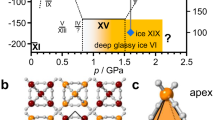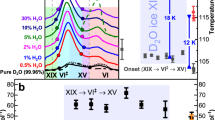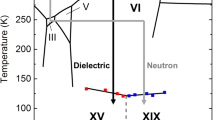Abstract
A few crystals exist which have residual entropy1,2. The most notable of these is hexagonal ice, Ih, the ordinary form of solid H2O (ref. 3). The structural interpretation of the residual entropy proposed by Pauling and widely accepted ascribes it to positional disorder of the protons in the ice conditions4. As such a disordered arrangement of the constituent atom cannot be an equilibrium structure of the crystal at the lowest temperature, there has been great interest in the search for a possible ordering phenomenon in ice crystals. We report here a calorimetric experiment which shows that a first order phase transition takes place in KOH-doped ice crystals and that the transition removes most of the residual entropy of the ice crystal.
This is a preview of subscription content, access via your institution
Access options
Subscribe to this journal
Receive 51 print issues and online access
$199.00 per year
only $3.90 per issue
Buy this article
- Purchase on Springer Link
- Instant access to full article PDF
Prices may be subject to local taxes which are calculated during checkout
Similar content being viewed by others
References
Wilkes, J. The Third Law of Thermodynamics (Oxford University Press, 1961).
Parsonage, N. G. & Staveley, L. A. K. Disorder in Crystals (Clarendon, Oxford, 1978).
Giauque, W. F. & Stout, J. W. J. Am. chem. Soc. 58, 1144–1150 (1936).
Pauling, L. J. Am. chem. Soc. 57, 2680–2684 (1935).
Haida, O., Matsuo, T., Suga, H. & Seki, S. J. chem. Thermodyn. 6, 815–825 (1974).
Haida, O., Suga, H. & Seki, S. J. Glaciol. 22, 155–164 (1979).
Dengel, O., Eckener, V., Plitz, H. & Riehl, N. Phys. Lett. 9, 291–293 (1964).
Polissar, J. & Pitzer, K. S. J. phys. Chem. 60, 1140–1142 (1956).
Onsager, L. in Ferroelectricity (ed. Weller, E.) 16–19 (Elsevier, Amsterdam, 1967).
Ueda, M., Matsuo, T. & Suga, H. J. Phys. chem. Solids (in the press).
Bjerrum, N. Science 115, 385–390 (1952).
Tatsumi, M., Matsuo, T., Suga, H. & Seki, S. Bull. chem. Soc. Japan 48, 3060–3066 (1975).
Van den Beukel, A. Phys. Stat. Solids 28, 565–568 (1968).
Pick, M. A., Wenzel, H. & Engelhardt, H. Z. Naturforsch. 26A, 810–814 (1971).
Haltenorth, H. & Klinger, J. J. Solid St. Commun. 21, 523–535 (1977).
Bilgram, J. H., Roos, J. & Gränicher, H. Z. Phys. B23, 1–9 (1976).
Kawada, S. J. phys. Soc. Japan 32, 1442 (1972).
Hentschel, H. G. Molec. Phys. 38, 401–411 (1979).
Minagawa, I. J. phys. Soc. Japan. 50, 3669–3676 (1981).
Author information
Authors and Affiliations
Rights and permissions
About this article
Cite this article
Tajima, Y., Matsuo, T. & Suga, H. Phase transition in KOH-doped hexagonal ice. Nature 299, 810–812 (1982). https://doi.org/10.1038/299810a0
Received:
Accepted:
Issue Date:
DOI: https://doi.org/10.1038/299810a0
This article is cited by
-
Tracking cubic ice at molecular resolution
Nature (2023)
-
Room temperature electrofreezing of water yields a missing dense ice phase in the phase diagram
Nature Communications (2019)
-
Surface premelting of water ice
Nature Reviews Chemistry (2019)
-
Doping-induced disappearance of ice II from water’s phase diagram
Nature Physics (2018)
-
Emergent high-Tc ferroelectric ordering of strongly correlated and frustrated protons in a heteroepitaxial ice film
Nature Physics (2016)
Comments
By submitting a comment you agree to abide by our Terms and Community Guidelines. If you find something abusive or that does not comply with our terms or guidelines please flag it as inappropriate.



